Manchester attack: Three more arrests in bomber investigation
- Published
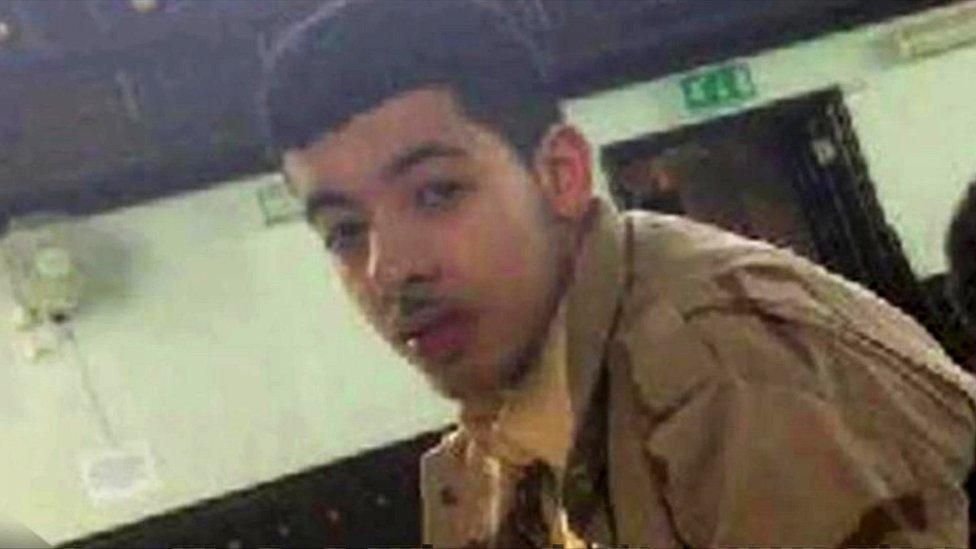
Salman Abedi has been named by police as the Manchester bomber
Three more men have been arrested as police continue to investigate whether Manchester Arena bomber Salman Abedi acted alone.
Abedi's 23-year-old brother has also been arrested.
Abedi killed 22 and injured 64 when he blew himself up outside an Ariana Grande concert on Monday night. An off-duty policewoman is among the dead, the BBC understands.
The UK terror threat level is now up to its highest level of "critical".
This means more attacks may be imminent.
Military personnel are being deployed to protect key sites.
The Palace of Westminster has been closed to the public following police advice, and will not re-open until further notice, its website said.
Home Secretary Amber Rudd said: "[Monday's attack] was more sophisticated than some of the attacks we've seen before, and it seems likely - possible - that he wasn't doing this on his own."
BBC security correspondent Frank Gardner said, external that the bomber is thought to have been a "mule", using a device built by someone else.

Who are the victims?
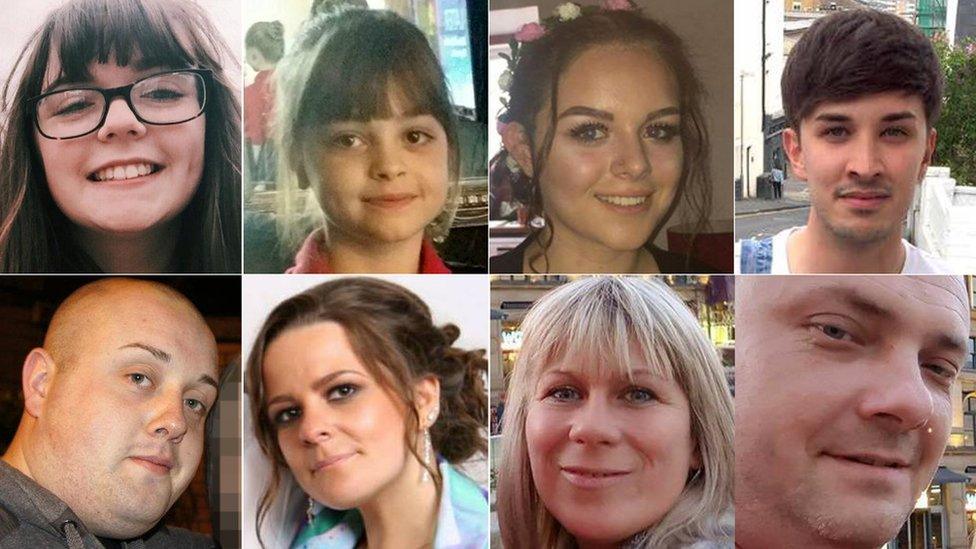
The victims include Nell Jones, 14, eight-year-old Saffie Roussos, Alison Howe, Lisa Lees, Jane Tweddle-Taylor, 50, Martyn Hett, 29, and Olivia Campbell, 15, .
Kelly Brewster, 32, John Atkinson, 28, Georgina Callander - thought to be 18 - and Marcin and Angelika Klis, a Polish couple from York, have also been named.
An off-duty police officer - who has not yet been named - was also among those killed, the BBC understands. Her husband is believed to be critically ill and their two children were also injured.
Of the 64 injured, 20 are in a critical condition, and some have lost limbs. Twelve of them are known to be children.
Several people are still missing, including Eilidh MacLeod, 14, from Barra in the Outer Hebrides, Chloe Rutherford, 17, and Liam Curry, 19.
Eilidh's friend, Laura MacIntyre, 15, who was also reported as missing, was later identified as one of the seriously injured in a Manchester hospital.
The police believe they have now identified all those killed and informed their families.
They will formally name the victims after post-mortem examinations, a process likely to take four or five days.
A hotline has been set up for people concerned about loved ones - 0800 096 0095.

What does a 'critical' threat level mean?
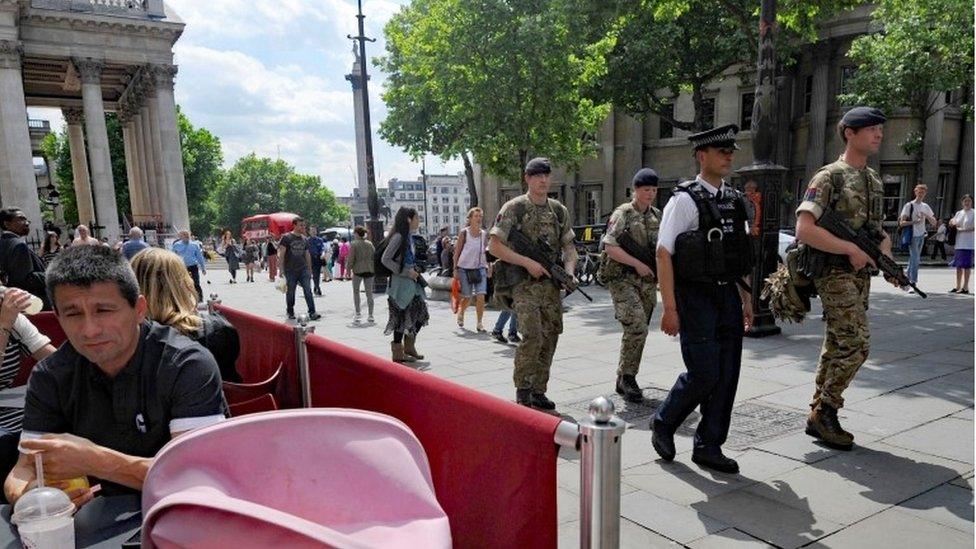
Soldiers join police officers patrolling in London
Prime Minister Theresa May said soldiers are being placed at Buckingham Palace, Downing Street, embassies and the Palace of Westminster to support armed police in protecting the public.
Military personnel may also be seen at other events over the coming weeks, such as concerts, Mrs May said, working under the command of police officers.
She said she did not want people to feel "unduly alarmed" but said it was a "proportionate and sensible response".
Mrs Rudd said 984 troops had been deployed in the first instance. Up to 3,800 are available.
She said she "absolutely" expected the raising of the threat level to critical to be temporary, adding that the bomber had been known "up to a point" by the intelligence services.
The highest threat level, which is decided by the Joint Terrorism Analysis Centre - a group of experts from the police, government departments and agencies - has only been reached twice before.
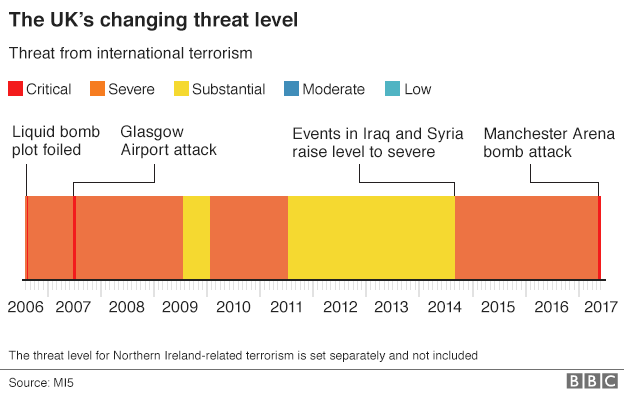
The first time the threat level was raised to critical was in 2006 during a major operation to stop a plot to blow up transatlantic airliners with liquid bombs.
The following year, security chiefs raised it once more as they hunted for the men who had tried to bomb a London nightclub and attacked Glasgow Airport.
The Metropolitan Police says it has increased its presence across London.
Meanwhile, Chelsea Football Club have cancelled their Premier League victory parade, due to take place in London on Sunday, so as not to divert police resources.
In Northern Ireland, extra police officers have also been deployed at key sites and on transport networks.

Who was the attacker?
Salman Abedi is understood to be a 22-year-old born in Manchester to parents of Libyan descent, and a former University of Salford student.
He attended Burnage Academy for Boys in Manchester between 2009-11.
Hamid El-Said, who worked for the UN on tackling radicalisation and who now works at the Manchester Metropolitan University, said Abedi had a "really bad relationship" with his family and his parents had tried but failed to keep him on the "right path".
"Eventually he was doing very bad at his university, at his education, and he didn't complete, and they tried to take him back to Libya several times. He had difficulties adjusting to European lifestyle," he added.
Abedi blew himself up in Manchester Arena's foyer shortly after 22:30 BST on Monday
Fans were beginning to leave a concert by US singer Ariana Grande
Witnesses at the arena described seeing metal nuts and bolts among the debris of Monday's bomb, and spoke about the fear and confusion that gripped concert-goers
The arena bombing is the worst attack in the UK since the 7 July bombings in 2005, in which 52 people were killed by four suicide bombers
So-called Islamic State has said - via IS channels on the messaging app Telegram - it was behind the attack, but this has not been verified
A former classmate of Abedi's told the BBC that he was a "very jokey lad" but also "very short tempered" and would get angry at "the littlest thing".
The man, who did not want to be identified, said Abedi was "away at random times throughout the year" but he did not know if he was abroad or playing truant because he hung around "the wrong crowd and was very, very gullible".
"You could tell him anything and he would pretty much fall for it."
He said that, before leaving the school in 2011, Abedi became "more and more religious" and that this might explain why he cut ties with former classmates.

What's happening with the investigation?
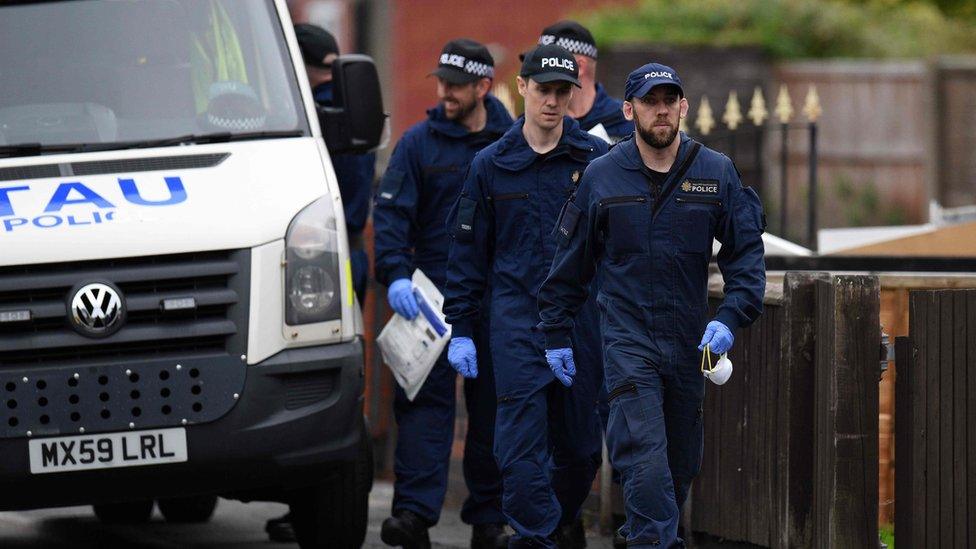
Apart from the three arrests in south Manchester on Wednesday, Abedi's older brother Ismael was arrested in Chorlton, south Manchester, on Tuesday in connection with the attack.
On Wednesday afternoon, police raided a block of flats near Manchester Piccadilly station in the city centre, requiring them to briefly close the railway line.
Met Police Assistant Commissioner Mark Rowley, who is the national counter-terrorism policing lead, said the investigation was "fast-moving and making good progress".
"However, a critical line of inquiry is whether the dead terrorist was acting alone or part of a group," he said.
"We still have critical lines of inquiry they're chasing down which has led to a level of uncertainty."
Anyone with information about the attack can call the anti-terror hotline on 0800 789321.